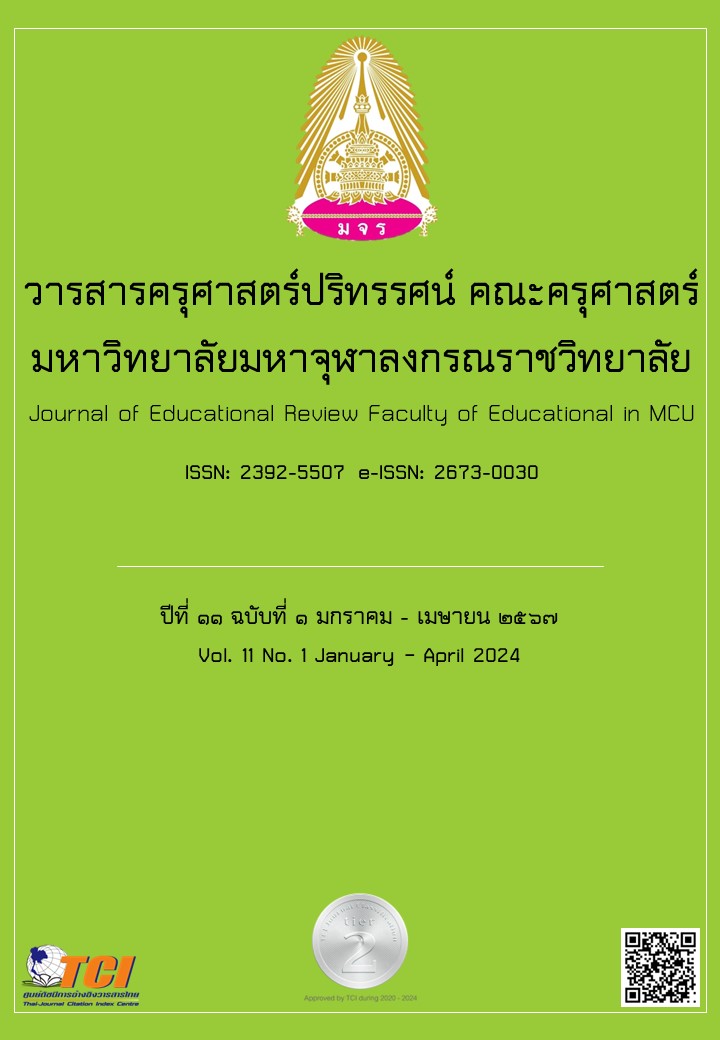A MODEL OF BALANCED SCHOOL ADMINISTRATION ACCORDING TO THE THREEFOLD TRAINING OF SCHOOL ADMINISTRATORS UNDER THE OFFICE OF PRIMARY EDUCATIONAL SERVICE AREA
Main Article Content
Abstract
The objectives of this research article were: 1) to study the present states and problems of balance school administration under the office of primary education, 2) to develop a model of balance school administration according to the Threefold Training of school administrators under the office of primary education service area, and 3) to propose the model of balance school administration according to the Threefold Training of school administrators under the office of primary education service area. The mixed research methodology was used in the study. The quantitative research, the samples consisting data were collected from 397 samples consisting of school directors, deputy directors and teachers by using questionnaires then data were analyzed by content analysis, percentage, mean, standard deviation. The qualitative research by documentary study, purposive in-depth interviews with 5 experts, focus group discussions with 9 experts and experiment the model of balance school administration according to the Threefold Training of school by seminar. The research instruments were documentary study form, questionnaire, interview form, group discussion form and model of balance school administration according to the Threefold Training of school administrators form. The results of the study found that: 1) The need of balanced school administration of school administrators, the highest need was a good physical and mental health. 2) Development of a balanced school administration model according to the principles of the Threefold Training of school administrators: the highest level was on utility, propriety, accuracy and feasibility, respectively. The results from the model tryout were suitable in all aspects. 3) The model of balanced school administration according to the principles of the Threefold Training of school administrators under the office of the primary educational service area consisted of 4 components. They were: (1) Principle; significance of work balance and the principles of the Threefold Training in school work development for effectiveness and happiness in school, (2) Objective; significance of personnel to work with happiness, (3) Process; a guideline of balanced school administration integrated with the principles of the Threefold Training, and (4) Evaluation; presenting the results of model tryout from a seminar. The explicit knowledge in form of language obtained from the study was concluded into H&M FRATS – Mcow for the benefit of school administration.
Article Details

This work is licensed under a Creative Commons Attribution-NonCommercial-NoDerivatives 4.0 International License.
ทัศนะและความคิดเห็นที่ปรากฏในบทความในวารสารฉบับนี้ถือเป็นความรับผิดชอบของผู้เขียนบทความนั้นเพียงผู้เดียว และไม่ถือเป็นทัศนะและความรับผิดชอบของกองบรรณาธิการ
กองบรรณาธิการขอสงวนสิทธิ์ในการคัดเลือกบทความลงตีพิมพ์และจะแจ้งให้เจ้าของบทความทราบหลังจากผู้ประเมินบทความตรวจอ่านบทความแล้ว
ต้นฉบับที่ได้รับการตีพิมพ์ในวารสารครุศาสตร์ปริทรรศน์ คณะครุศาสตร์ มหาวิทยาลัยมหาจุฬาลงกรณราชวิทยาลัย ถือเป็นกรรมสิทธิ์ของคณะครุศาสตร์ มหาวิทยาลัยมหาจุฬาลงกรณราชวิทยาลัย ห้ามนำข้อความทั้งหมดหรือบางส่วนไปพิมพ์ซ้ำ เว้นเสียแต่ว่าจะได้รับอนุญาตจากมหาวิทยาลัยฯ เป็นลายลักษณ์อักษร
References
ทวีศักดิ์ ทองทิพย์. (2561). การบริหารสถานศึกษาโดยใช้หลักไตรสิกขาของโรงเรียนวัดพระบาทเขากระโดง อำเภอเมือง จังหวัดบุรีรัมย์. วารสาร Mahachulagajasara Journal. 8. 22-31.
ปัทมาวรรณ จินดารักษ์ และคณะ. (2562). สมดุลระหว่างชีวิตและการทำงานกับความหลากหลายของกลุ่มวัย. วารสารนักบริหาร. 39(1). 1-11.
พระพรหมคุณาภรณ์ (ป. อ. ปยุตฺโต). (2546). รุ่งอรุณของการศึกษา เบิกฟ้าแห่งการพัฒนาที่ยั่งยืน. พิมพ์ครั้งที่ 2. กรุงเทพมหานคร: พิมพ์สวย.
สำนักงานกองทุนสนับสนุนการสร้างเสริมสุขภาพ. (2560). ศูนย์องค์กรสุขภาวะครอบครัว Happy Workplace. กรุงเทพมหานคร: แอทโฟร์พริ้นท์.
สุมานพ ศิวารัตน์. (2560). การพัฒนาคุณภาพชีวิตด้วยไตรสิกขา. วารสารสถาบันวิชาการป้องกันประเทศ. 8(1). 36.
สุวารีศิริ ภู่เปี่ยมสินธุ. (2557). ดัชนีความสุขในสถานศึกษาขั้นพื้นฐาน. ดุษฎีนิพนธ์พุทธศาสตรดุษฎีบัณฑิต. มหาวิทยาลัยศิลปากร.
Clark. (2001). Sue Campbell, Work cultures and work/family balance. Journal of Vocational Behavior. 58(3). 348-365
Hutton, A. (2005). The case for work/life balance: closing the gap between and policy practice. New Zealand: Hudson Highland Group.
Keeves. (1988). Educational research methodology, and measurement: An international handbook. Oxford. England: Pergamon Press.
Stufflebeam, D. L. (2022). CIPP evaluation model checklist: A tool for applying the CIPP Model to assess long-term enterprises. From http://www.wmich.edu Retrieved March 20, 2022.


